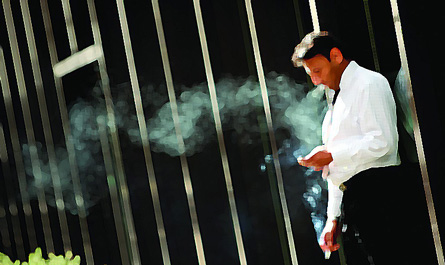Page 1 Page 2
I was standing in front of the building where I worked, smoking a cigarette and ruminating bitterly over a recent memorandum announcing that soon the front of the building would become a smoke-free zone. It would be the latest conquest in a relentless march of smoke-free zones that had routed me from my office and chased me from the cafeteria and the restroom and, finally, booted me out through the big, glass entrance door to the portico at the front of the building, where I have routinely stood (several times a day), outcast and despised, along with a ragtag group of fellow practitioners, through snow and rain and icy cold. Yet, the pursuit continues. Is there no respite, no place where we can belong? I felt like Joan of Arc (That is to say, how I imagined she might have felt, if she had been a man who smoked and worked in an office building).
Suddenly, I was confronted with the intrusive, unexpected presence of a grinning, sparkle-eyed stranger. I puffed my cigarette and tried to refocus on my mournful, self-pitying thoughts and, in the process, think away the stranger and the memo and my bleak, looming smoke-free future. But this infringing person was smothering my thoughts.
“Nice day,” he said cheerfully.
“Yeah,” I replied after several seconds, without making eye contact and in the lowest, softest vocal register I could possibly muster without moving my lips. Then, I took a deep, savoring drag on my cigarette and blew the smoke out in a long, indifferent whistling stream.
“So how’s it going?” he asked, as if he had not even noticed my uninviting body language.
“Fine,” I replied with polite resignation, although politeness on my level was the absolute last thing on my mind since I had been (by design) smack in the middle of at least forty feet of completely free, empty space in every direction; until this suddenly-appearing, interloping person, for whatever earthly reason, chose to stand not one foot from my left elbow. I wasn’t going to move. After all, I had been there first and had claimed that spot and all the appropriate social buffer distance which surrounded it.
“You know,” he said, clearly opening the door to an entire conversation, “I failed the whole course.”
“Oh,” I replied, pissed off, because people will persist in bothering you, no matter how hard you try to find your own space; and because the world hates smokers; and soon the smokers probably would have to meet secretly in the woods at midnight like devil worshipers.
“I failed the whole damn French course.”
“That’s too bad,” I said, not really caring whether or not he perceived that my carefully feigned sympathy was, in fact, sarcasm in disguise.
“It wasn’t for credit, and it doesn’t matter anyway,” he continued with feeble, unconvincing flippant shrugs. Then sadly, he dropped his eyes to the ground, an act that belied his bravado.
And I could tell at once that this disappointment was real, an open fresh wound perhaps, deep and raw; a wound which had, in the process of occurring, skinned off layers of delicate protoplasm down to the core, to the very absolute marrow of his soul.
“It happened 20 years ago.”
Well, maybe not, I reconsidered. And now it seemed that this was truly an ancient failure: a French course, twenty years ago? Such a thing is no more than a scraped knee in the scope of a life. I thought, my God, man, get over it!
But curiously, as I looked at him at that moment, all of my previous annoyance evaporated. I supposed it was then that I regarded him for the first time as an actual suffering human being, such as myself. We had that common bond: the nature of being human. Each of us bears a cross. In this instance, the poor fellow was suffering unnecessarily. Twenty years, good grief! Baudelaire was, of course, correct, I silently pontificated, when he said, “Remembering is only a new form of suffering.” Why do we have this penchant for constantly regurgitating the past and then beating ourselves up with it until we’re dripping from head to toe with slimy lumps of foul regurgitated past? This process serves no useful purpose whatsoever. Put it all behind you. Move on, I thought.
He looked back at me and laughed as if he had actually heard my thoughts screaming out through the white bone walls of my brain. I laughed along with him, until I noticed that he wasn’t laughing with me. He was, and then he wasn’t. The complex human interactive dance is all a matter of timing. Oh, and having a nice, warm smile helps, as well. Good bright teeth also help in that regard. Unfortunately, cigarettes have diminished mine somewhat.
“But I filed a report with the East Germans,” he said, regarding me with a certain narrow-eyed seriousness. Then, as he gave me a quick, conspiratorial wink, I realized that I didn’t have the vaguest notion what we were talking about. “I figure, let them pick up the pieces,” he said with a smile and a demonstrative tilted head shrug: shoulders hunched, flat palms raised in supplication.
Page 1 Page 2
Pages: 1 2



Interesting story, I truly appreciate the internal dialogue your character has on an ongoing basis. It’s a true representation of the human mind running through so many thoughts at once during a conversation, albeit one with a lunatic, to continue firing on all cylinders and actually keep up.
Keep the stories coming!